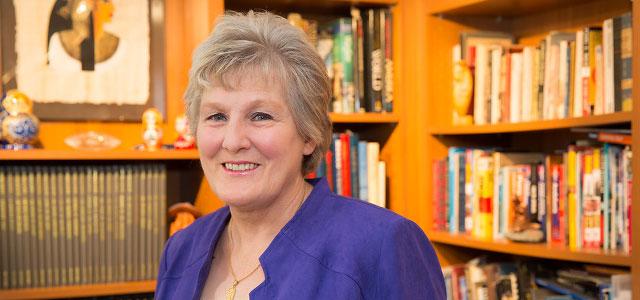
Marilyn “Marty” Douglas (photo by Elisabeth Fall)
Championing Nursing That Respects Patients’ Cultural and Religious Beliefs
During her more than five-decade career as a nurse and scholar, Marilyn “Marty” Douglas has championed transcultural nursing, the idea that patients heal best when they receive care that respects their cultural backgrounds and personal and religious beliefs.
Douglas received her doctorate in international and cross-cultural nursing at UC San Francisco School of Nursing in 1989, served as president for the Transcultural Nursing Society and is editor in chief emerita of the Journal of Transcultural Nursing.
In March, at the American Association of Colleges of Nursing’s spring meeting, she received the Nurse.com/Gannett Foundation Lectureship Award for Diversity, Inclusion, and Sustainability in Nursing Education.
But as the now-retired Douglas describes it, holding a deep appreciation for the richness and variety of different cultures – and of people’s common humanity – has been a theme throughout her life.
Early Years
She grew up in a Slovenian family in Cleveland, a city she loved for its patchwork of neighborhoods with strong ethnic identities. As soon as she paid off her debts for her nursing studies at Ohio State University, she signed up for the Peace Corps.
She was assigned to Colombia, which in the early 1970s was still a developing country. With only two months of Spanish-language training, she had to dive in as the head nurse in an intensive care unit in a Bogotá hospital, the only hospital in the country specializing in cardiac care. She also provided community health care in an “invasion” barrio – a type of shantytown – and at a girls’ orphanage. In her second year, she set up the nursing components of an ICU and trained its staff in the university hospital in Cali. Having to work in a second language with patients and medical professionals whose backgrounds were very different from her own quickly taught her that the “American way” of doing things wasn’t always the best.
“This piqued my interest in exploring transcultural nursing,” she says.
A few years later, she minored in anthropology when she pursued a master’s degree in nursing at the Catholic University of America in Washington, DC. In this way, she followed a similar path as Madeleine M. Leininger, a nurse with an anthropology PhD who established transcultural nursing as a specialty in the 1950s.
Douglas admits her favorite transcultural story is personal and puts her in the role of patient. When she was seven months pregnant with her second child, she and her husband, John Douglas, a science writer and Fulbright scholar, moved to Tokyo.
She learned pretty quickly that, for the month of her expected delivery, there were no beds available at any of Tokyo’s major hospitals serving English-speaking patients. She ended up giving birth in a more typically Japanese setting – at a small maternity hospital where the doctor and nurses spoke little or no English.
A precious moment came the morning after her son’s birth. A night nurse stopped by her room and in halting English, asked, “Good morning. How are you?”
Douglas says, “It drew tears to my eyes. She must have spent a good portion of the night shift looking up the words in the dictionary and practicing those few lines.”
Douglas likes to share this story with students to highlight the benefits of making even a small gesture to acknowledge a patient’s culture or language. “Just try to say a few words in their language,” she says. “It will be music to their ears.”
Putting Transcultural Values into Practice
She continued to focus on transcultural nursing as a doctoral student at UC San Francisco. She spent four months in a Mexico City hospital, where she studied how cardiac patients in a non-US setting dealt with pain.
She also put transcultural values into practice at Stanford Health Care, where she was a cardiovascular nurse specialist and taught classes on the need to consider patients’ cultural backgrounds in their ICU and end-of-life care. As the associate chief of nursing for research at the VA Palo Alto Health Care System, she was often called upon to address intercultural conflicts among nursing staff.
Since retiring, she continues to write about transcultural nursing, focusing these days on how increasing diversity in the United States and globalization affect daily nursing practices. “Nurses, by the very nature of our work, will have to become citizens of the world to be able to care for our increasingly diverse population,” she says.
She values her time as a UC San Francisco student and faculty member. It enriched her professionally and informs her current volunteer work, mentoring international School of Nursing students who are non-native English speakers. She helps them write exam papers and dissertations.
Of her doctoral studies at UC San Francisco, she says, “The program helped give structure to a lifetime of experiences with people of various cultures, and channel that knowledge into defining meaningful ways to provide care for diverse populations.”



